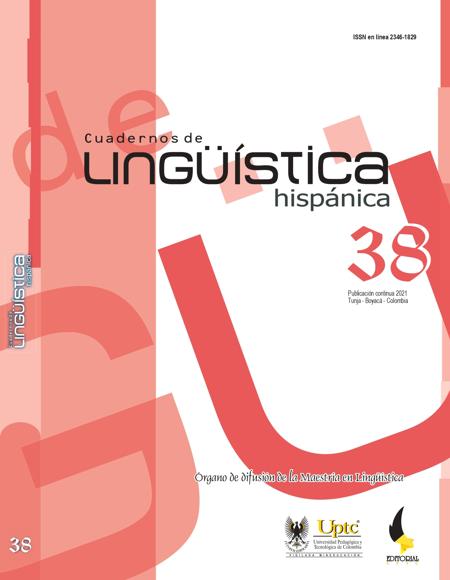Spanish as a Foreign Language through Colombian Festivals Language

Abstract
This paper presents the process of the research entitled “Spanish as a Foreign Language SFL Teaching through Colombian Festivals Language”, which sought to promote its learning, from the perspective of strengthening of interculturality. It was circumscribed in the interpretive paradigm with a qualitative approach based on culture as inherent content of the process. It is a study with the help of a pilot test that involved the design of teaching units for C Level of CEFR that would stimulate it in other languages learners. It was sought to activate communicative and intercultural competence, so that non-native speakers of Spanish had access to the meanings that speakers from different Colombian regions give them. For which a theoretical framework on the relationship between language and culture was needed. As a result, this research has not only a pedagogical-didactic value, but also a sociocultural one, since it confirms that learning a language is inhabiting the culture that speaks it. It is
concluded that SFL teaching through ordinary language is a viable and a productive strategy because it implies a genuine immersion.
Keywords
SFL, interculturality, ordinary language, culture, popular culture , festivals
References
- Altamar, W. (2015) La cultura como herramienta para la enseñanza del español como lengua extranjera. Universidad del Norte.
- Amador, J. (2012). Los modelos de la comunicación y los límites del estructuralismo: perspectivas para una teoría antropológica de la comunicación. Derecho a Comunicar, (2), 13-35.
- https://biblat.unam.mx/es/revista/derecho-a-comunicar/articulo/los-modelos-de-comunicacion-y-los-limites-del-estructuralismo
- Bajtín, M. (1996). La cultura popular en la Edad Media y el Renacimiento. Alianza.
- Berger, P. & Luckmann, Th. (2003). La construcción social de la realidad. Amorrortu.
- Byram, M. (1997). Teaching and Assessing Intercultural Communicative. Multilingual Matters. Competence.
- Geertz, C. (2003). La interpretación de las culturas. Gedisa.
- González, M. (1989). El taller de los talleres: aportes al desarrollo de talleres educativos. Estrada.
- González, Ma. (2007). Fiesta y nación en Colombia. Magisterio-Aula Abierta.
- Hernández, R., Fernández, C. & Baptista, P. (2010). Metodología de la investigación. (5.a ed.). McGraw-Hill.
- Hymes, D. (1996, jun.). De la competencia comunicativa. Forma y Función, (9), 13-37.
- Instituto Cervantes (2001). Marco Común Europeo de Referencia para las Lenguas: aprendizaje, enseñanza, evaluación. MECD-Anaya. http://cvc.cervantes.es/ensenanza/biblioteca_ele/marco/
- Kress, G. (2010). Multimodality. A Social Semiotic Approach to Contemporary Communication. Routledge.
- Kvale, S. (2011). Las entrevistas en investigación cualitativa. Morata.
- León, J. (2015). Perspectiva antropológica de la comunicación. Una crítica a la comunicación mediática. Revista Internacional de Comunicación y Desarrollo, 1, 73-82.
- López, A. (2012). Del Tractatus lógico-philosophicus a las investigaciones filosóficas y la teoría de los juegos lingüísticos de Ludwig Wittgenstein. http://www.scielo.org.co/pdf/esupb/v20n44/v20n44a06.pdf
- Luhmann, N. (1996). La ciencia de la sociedad. Universidad Iberoamericana.
- Martínez, M. C. & Rayo, L. (2019). Colombia diversa. Instituto Caro y Cuervo.
- Motta, J. H. (2016). El valor del silencio en la cultura escolar. Cuadernos de Lingüística Hispánica, (28), 167-187. http://dx.doi.org/10.19053/0121053X.4914 DOI: https://doi.org/10.19053/0121053X.4914
- Motta, J. H. (2017). La actitud de escucha, fundamento de la comunicación y la democracia en el aula. Cuadernos de Lingüística Hispánica, (30), 149-169. https://doi.org/10.19053/0121053X.n30.0.6192 DOI: https://doi.org/10.19053/0121053X.n30.0.6192
- Motta, J. H. et al. (En imprenta). Enseñanza del español como lengua extranjera ELE, a través del lenguaje de las fiestas colombianas. Sello Editorial de la UPTC.
- Ocampo, J. (1997). Las fiestas y el folclor en Colombia. El Áncora.
- Ong, W. (1994). Oralidad y escritura. Tecnologías de la palabra. Fondo de Cultura Económica.
- Wittgenstein, L. (1988). Investigaciones filosóficas. Crítica.
- Wittgenstein, L. (2013). Tractatus lógico-philosophicus. Tecnos. DOI: https://doi.org/10.4324/9781315884950